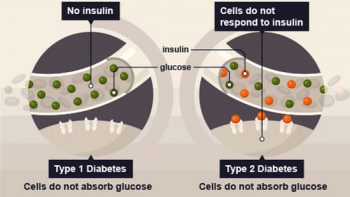Type 1 diabetes (diabetes mellitus) and type 2 diabetes both affect a child’s ability to regulate blood sugar in the body, but essentially they are separate diseases.
Type 1 Diabetes and Type 2 Diabetes: Similar Name, Different Diseases.
Type 1 Diabetes:
- The body’s immune system destroys the cells that make insulin. Meaning the body cannot absorb energy-producing sugar, requiring the type 1 diabetic to use insulin as his or her life saving treatment.
- Symptoms like thirst, frequent urination and lack of energy tend to transpire quickly. It is often misdiagnosed and if not caught in a timely manner can lead to severe life threatening complications.
- Children with this type can have many episodes of low blood sugar known as hypoglycemia and high blood sugar known as hyperglycemia. A myriad of factors can influence insulin needs including food intake, level of activity, hormones, illness and stress.
- It is a chronic, incurable auto-immune disease that is currently not preventable.
- It is less common. It accounts for 5 to 10 percent of those diagnosed with diabetes.
Type 2 Diabetes:
- Produces insulin, but the insulin becomes inefficient at regulating blood sugar.

- Some symptoms are similar to the type 1 diabetes, but happen over long periods of time, which becomes dangerous as some children do not recognize them.
- Children who have trouble metabolizing insulin tend to mainly have hyperglycemia. If hyperglycemia is uncontrolled over an extended period of time it can lead to serious life altering complications.
- Genetics and lifestyle play a large role in this type, and may be preventable. Once diagnosed, symptoms may be suspended with tight control of blood sugar; however, symptoms will return if control becomes lax.
- It is the more common type of diabetes, accounting for approximately 95 percent.
One of our goals at Will’s Way is to educate schools officials, family members and those who love someone with type 1 diabetes about what type 1 diabetes is…and what it isn’t. We are not a medical organization, and at no time do I or any of our staff members give medical advice, but what we strive to do is spread the facts about type 1 diabetes while dispelling the myths.
If you or someone you know has been recently diagnosed, please reach out to us. We will be happy to answer questions about how we may be able to help alleviate some of your stress.

Leave a Reply
You must be logged in to post a comment.